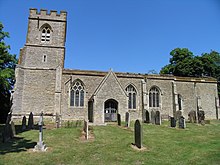St Lawrence's Church, Broughton
| St Lawrence's Church, Broughton | |
|---|---|
 St Lawrence's Church, Broughton, from the south | |
| 52°03′08″N 0°41′52″W / 52.0522°N 0.6979°W | |
| OS grid reference | SP 894 401 |
| Location | Broughton, Milton Keynes, Buckinghamshire |
| Country | England |
| Denomination | Anglican |
| Website | Churches Conservation Trust |
| History | |
| Dedication | Saint Lawrence |
| Architecture | |
| Functional status | Redundant |
| Heritage designation | Grade I |
| Designated | 17 November 1966 |
| Architectural type | Church |
| Style | Gothic |
St Lawrence's Church is a redundant Anglican church in Broughton, Milton Keynes, Buckinghamshire, England. The church is recorded in the National Heritage List for England as a designated Grade I listed building,[1] and is under the care of the Churches Conservation Trust.[2] The church stands on the eastern periphery of Milton Keynes, between the A4146 and (former) A5130 roads.[3] It is listed at Grade I because of its "remarkable series" of medieval wall paintings.[1]
History
[edit]The church was built in the 14th and 15th centuries. It was restored in the 19th century, when the chancel was rebuilt.[1] In 1849 a series of medieval wall paintings were discovered that had been covered in plaster for 300 years.[2] These were restored in the 1930s by Professor Tristram.[1] The church was vested in the Churches Conservation Trust on 1 August 1987.[4]
Architecture
[edit]Exterior
[edit]St Lawrence's is constructed in stone, and has lead roofs with plain parapets. Its plan consists of a nave without aisles, a south porch, a chancel, and a west tower. The tower is in three stages with diagonal buttresses and an embattled parapet. On the south side of the church are three three-light windows. To the west of the porch is a 14th-century window with reticulated tracery, and to the east of the porch are two Perpendicular windows. On the north side of the church is a staircase to the rood loft.[1]
Interior
[edit]The wall paintings in the nave date from about 1400.[1] On the south wall is a depiction of Saint George and the dragon: Saint George lost his head in the 15th century when the ceiling was lowered. On the north wall there are a doom painting and a Pietà; these are designed as a warning against swearing. There are also paintings of Saint Helena and Saint Eligius.[1][2] The pulpit dates from the late 17th or early 18th century. The memorials include a series of black marble stones under the altar, fragments of brasses from the 14th and 15th centuries, and a 17th-century wall monument. The stained glass in the east and south windows of the chancel by Kempe dates from 1894, and that in a south window in the nave dating from 1864 is by A. Gibbs.[1] There is a ring of four bells, but these are no longer ringable. The oldest two were cast in about 1470 by William Chamberlain; the others were cast in 1622 by James Keene, and in 1655 by Anthony Chandler.[5]
See also
[edit]References
[edit]- ^ a b c d e f g h Historic England, "Church of St Lawrence, Broughton (1332313)", National Heritage List for England, retrieved 29 December 2013
- ^ a b c St Lawrence's Church, Broughton, Buckinghamshire, Churches Conservation Trust, retrieved 25 April 2011
- ^ Broughton, Streetmap, retrieved 25 April 2011
- ^ Diocese of Oxford: All Schemes (PDF), Church Commissioners/Statistics, Church of England, 2011, p. 2, retrieved 25 April 2011
- ^ Milton Keynes, Broughton, S Lawrence, Dove's Guide for Church Bell Ringers, retrieved 25 April 2011

